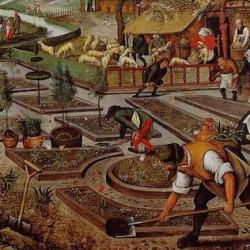According to Richard Landes (Heaven on Earth), traditional societies are organized by a “prime divider,” a boundary between elites and commoners. He follows Ernest Gellner in called these “agro-literate” societies, since that phrase names two key technologies that mark the division. More generally, “Elites construct prime dividers along four major lines: legal privilege, stigmatization of manual labor, restricted access to the technologies of knowledge, and weaponry— all imposed by potentes who possess ‘honor’ and ‘status’” (216).
Modernity is a product of civil polities that undermines these prime dividers. Landes isolates four main elements in the formation of an alternative social order:”isonomia [equality before the law], widespread literacy, dignity of manual labor, and positive-sum attitudes that transcend honor-shame dynamics” (227). He discovers these in “the communes of eleventh-century Europe, the peasant rebellions of the late Middle Ages (e.g., England, 1381) and early modern period (e.g., Germany, 1525), the Puritan Revolution of the seventeenth, the American and French of the eighteenth, and the Socialist and Zionist movements of modern times.” Each “made appeals to equality before the law, all spoke of manual labor as a unique source of dignity, all leaned heavily for their support on the existence of a class of commoners who could read or cared about the contents of texts, and all, at least in their nascent stages, emphasized the importance of overcoming the obsession with externally defined ‘honor’” (227).
Though these elements are evident in classical Athens, Landes thinks that ancient Israelite civilization was more decisive in the rise of the modern world: “this culture emphasized the importance of isonomia, mass education, manual labor, and the substitution of integrity for honor, long before, and with much greater consistency and depth, than Greek or even Athenian society. And perhaps because of this consistency—unlike Athens, there were few voices of dissent on any of these matters—the culture and its traditions survived in an unbroken chain from the ancient world to the present. Moreover, since the principal (but not sole) source of these values, the Hebrew Bible, became the canon of the dominant religion of European society, these attitudes found much more accessible expression—and to a much wider audience—through religious than through classical studies” (230).
After examining each of these themes in the Bible, Landes notes the continuity between Hebrew prophecy and the aspirations of modern social and political reformers: “the goal of demotic millennialism (as imagined in the millennial song of Isaiah/Micah) is to dismantle traditional, belligerent authoritarian and socially stratified (prime-divider) societies, and replace them with a universal network of free, productive civil polities, living in mutual and voluntary peace and exchange, enforced by a discourse of judicial fairness. It is at once a modern ideal and an ancient prophetic dream” (239).
That these are institutionalized in any degree in modern politics is due, he says, not to the theorizing of a Locke or Mill nor to the calm application of biblical paradigms to society. Rather, “the key to ‘launching’ an experiment in civil polity begins with apocalyptic enthusiasm, navigates disappointment, and stabilizes upon reentry to normal time. Initially fueled by the belief in an imminent radical transformation of the world, riding on the surge of enthusiasm such beliefs inspire, movements attempt to inaugurate a millennium of equality, and dignity of manual labor, made up of autonomous individuals inspired by mutual love for each other, voluntarily renouncing violence, envy, and greed. They fail of course, but to the degree that they pursued their goals ‘tautologically’ – that is, remained faithful to their demotic values during the period of post-apocalyptic transition – to that degree their ‘reentry’ into normal time can preserve significant features of their millennial ideal” (240).
That is put too Whiggishly, Landes knows. The “reentry” is fraught, often violent, sometimes tyrannical. Yet apocalypticism leaves its traces and remakes the world – not a completely as the millennialists would wish, but enough to see in it something of a miracle of political transformation.















